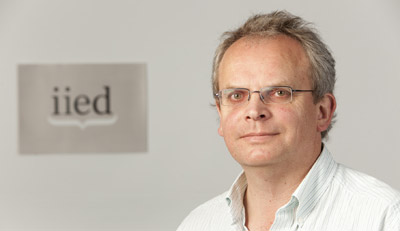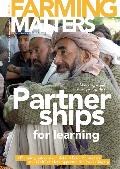Interview > Bill Vorley – Small-scale farmers are being urged into international markets as a way out of poverty – and they need to be able to protect their interests and make effective choices. “We see agency as the capacity of small-scale producers to make effective choices that advance their interests, and to act on those choices. Nowhere is that capacity needed more than in markets.”

Why start a new programme on smallholder agriculture? What are the issues this is responding to?
Right now, a lot of expectations are piling up at the doorstep of smallholder farmers. They are expected to deliver global food security. They are expected to be engines of rural poverty reduction. They are expected to manage natural resources and adapt to climate change. And they are expected to organize themselves in regional and global markets.
By building this agenda in the world of donors and international NGOs, we risk making the same mistake that has beset so many development interventions — treating poor people and smallscale producers as passive beneficiaries of an external agenda, rather than as agents in their own development and as economic actors in their own right. The purpose of the Knowledge Programme is to change this approach.
What does it mean for small-scale farmers to be agents in their own development?
We are defining agency as the capacity of small-scale producers to make effective choices that advance their interests, and to act on those choices.
Nowhere is that capacity needed more than in markets. There are a lot of promises out there about the ability of markets to “work for the poor”. In much of the world, globalisation is changing the way that markets operate, exposing small-scale producers to risks and opportunities. The price of food is going to be very volatile because of increased demand, changes in climate, speculation.
There are NGOs in the countryside saying, you should be diversifying, growing high-value crops, forming a co-operative. There are companies looking for new sources of supply. There are new market instruments to pay land users for managing carbon in their soils and managing biodiversity on their farms.
So agency is the knowledge and skills to find your own course through those risks and opportunities — and also to shape the rules that govern them.
So how does the Knowledge Programme tackle this?
A global learning network has been established of people who work with, support and lead small-scale producers. Not just researchers, but also farmer leaders, traders and businesspeople — there’s the former director of a large Indian retail company in there, and there’s an officer of a regional African farmers’ federation, for example.
The learning network is pursuing a programme of research and advocacy, bringing new voices and analysis to support smallholder agency and shape the global debate. The aim is to figure out some new pieces of the puzzle — for example, regional trade agreements, arrangements that empower small producers in supply chains, and ways that informal markets can make a difference.
You’re talking about taking on sprawling global changes. How do you face the challenge of scale?
There are about half a billion small-scale farmers in the world. So it can seem ridiculous to say that we will, as just one organisation, support smallholders in finding their way through this tremendously challenging situation.
But the learning network model has a lot to offer. The overall programme is a collaboration between this learning network, IIED in the UK and HIVOS in the Netherlands. The network is led from Bolivia, with member groups in Peru, Nicaragua, Kenya, Uganda, India and Indonesia. Those groups also have their own networks in their countries. They’re grounded at the grassroots, but the insights they develop can spread through the network. It’s not so much top-down or bottom-up. It’s more middle-out. It’s been 18 months in development, and by the end of next year, I think we’re going to have some really useful insights.
In Europe, you’ve also launched a series of “provocations” – debates around smallholder agriculture. What’s the purpose of those?
We’re well aware that a lot of development policies are set in the headquarters of ministries and businesses. So you also need to shake the tree here in Europe. That’s why we set up what we call “provocations”, looking at some of the big assumptions in this area of markets and small-scale production.
Why “provocations”? Are you trying to stir people up?
We want to challenge parts of the discussion around smallholders and markets that have got stuck. For instance, the way that the development community paint two opposing development paths, one marked “rights-based” and the other “market-based”. Or the division between how the development community look at smallholders and how they look at farm workers. Each “provocation” will be a three-hour session in a different European city, streamed over the internet in English and Spanish, and also communicated through Farming Matters.
How can small-scale farmers get involved with this work?
In the countries where we have a learning network member, smallholders can be involved through them. And we really encourage small-scale producers and their organizations, as well as businesspeople and policymakers, to connect with this programme through our websites at IIED and HIVOS – to help us bring new perspectives to this debate around smallholders and markets.
Interview: Anna Barnett
More information:
For more information about the Knowledge Programme and the “provocations”, please send Bill Vorley an e-mail: bill.vorley[at]iied.org

